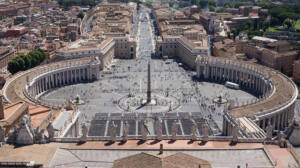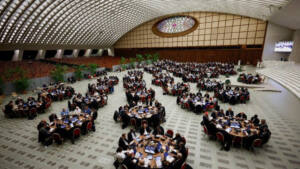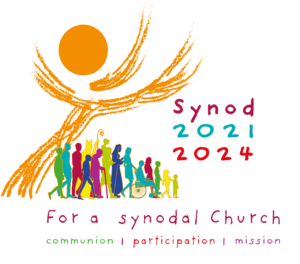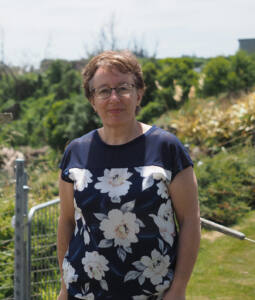WelCom April 2024
As the universal Church continues its synodal journey towards the second and final session in Rome in October this year, here is a recap of the Synod on Synodality steps so far.
For a synodal Church; communion, participation, mission

Pope Francis has called upon the Church to rejuvenate her synodal roots, to pray, listen, and discern together what the Holy Spirit is saying to the Church today – all for the sake of the Church’s evangelising mission.
In 2021 Pope Francis opened the synodal process, which he hopes will reframe and renew our common journey forward. He called on Catholics around the world to reflect on the theme of ‘Communion, Participation, and Mission’ in the context of the life of the Catholic Church.
The Synod on Synodality began as a two-year process of spiritual discernment consisting of listening and dialogue throughout the Universal Church, with an invitation for all the baptised to participate. In October 2022, Pope Francis announced there will be two sessions of the Assembly: October 2023 and October 2024.
The Synod has provided an opportunity for serious reflection and action to deepen an understanding of the role of all the members of the Church. The process began in the local Church at the diocesan stage and then moved to national and continental stages, before moving to the Universal Church with the first global assembly in Rome in October 2023.
The work of the Synod on Synodality is now continuing towards the Second Session of the Synodal Assembly in October 2024. In December 2023, the General Secretariat of the Synod released a new papal document, ‘Towards October 2024’, about steps to be taken between December 2023 and the Second Session in Rome in October this year. Churches worldwide have been called to reflect on the Synthesis Report, published October 2023, to promote further consultation and to prepare contributions to be sent to Rome by 15 May, for this year’s assembly, to advise the Pope on the topic ‘For a Synodal Church: Communion, Participation, Mission’.
Ultimately, Pope Francis will offer a Post Synodal Apostolic Exhortation based on what is presented to him throughout the process.
Towards October 2024: How can we be a Synodical Church in Mission?

Following the First General Assembly of the Synod of Bishops in October 2023, dioceses around the world have been asked to carry out a further consultation, albeit within a short timeframe and with specific groups within the particular diocese. This consultation has been guided by the question: ‘How can we be a Synodical Church in Mission?’ Local churches have been asked to identify concrete actions that enable individuals and groups to make their unique contribution to the Church’s mission. After the contributions of the dioceses are collected, national summaries will be drawn up, at not more than eight pages each, to be sent to the General Secretariat of the Synod by 15 May 2024.
In December 2023 the Ordinary Council of the General Secretariat of the Synod, released a statement about steps to be taken in the months between December 2023 and the Second Session of the Synodal Assembly, October 2024, for the whole Church to continue the journey ‘For a Synodal Church, Communication, Participation, Mission’.
The new papal document ‘Towards October 2024’, published on December 11, 2023, emphasised that the next session would focus on how to live synodality at all levels in the Church.
The document clarifies some of the most significant themes that emerged from listening to the Churches will require a substantial amount of time for theological, canonical, and pastoral reflection.
In the document Churches have been asked to promote further consultation and to prepare contributions for the assembly in October, with the focus on ‘how to be a synodal Church in mission?’.
The document directs that this guiding question be addressed at two levels with the Synthesis Report at its reference point.
At a local level the question is: ‘How can we enhance the differentiated co-responsibility in the mission of all members of the People of God?’
At the second level involving relations between Churches and the Bishop of Rome, the question is: ‘How can these relations be creatively articulated in order to find a dynamic balance between the dimension of the Church as a whole and its local roots?’.
The aim is to identify the paths to follow and the tools to adopt to ‘enhance the unique contribution of each baptised person and of each Church in the one mission of proclaiming the Risen Lord and his Gospel to the world today.’
With all this in mind, the Secretariat of the Synod has invited each local Church to carry out a further consultation.
However, the document explains, this stage of the work will not start from scratch and, therefore, will not involve repeating the process of listening and consultation undertaken during the first 2021–2023 stage.
After the contributions of the dioceses are collected, national summaries will be drawn up to be sent to the General Secretariat of the Synod by 15 May 2024. This material will contribute to the drafting of the instrumentum laboris, the Synod’s working document for the second session.
In January this year, the New Zealand Catholic Bishops Conference co-ordinated with the six dioceses to set out the method and timeline for this process; and will be collating the fruits of the diocesan consultations and writing a summary document to be sent to Rome by 15 May.
Dioceses and groups in New Zealand have been having sessions and workshops to provide an opportunity for groups to participate in this phase of the consultation.
Keeping the synodal dynamism alive
Local churches have also been invited to go through the entire Synthesis Report and collect specific requests that reflect their specific situation. This will allow them to promote the most appropriate initiatives to involve the entire People of God (for example, formation activities, theological in-depth studies, celebrations in a synodal style, grassroots consultations, listening to minority peoples and groups living in poverty and on the margins creating spaces for controversial issues etc).
Bishops’ conferences have also been invited to continue to encourage initiatives that promote the synodal and missionary dimensions of the Church, to collect the testimonies and good practices presented by the dioceses, and send them to the General Secretariat of the Synod by 15 May 2024.
Source: Vatican News
Synod on Synodality organisers invite 300 parish priests to a listening session in Rome that will include papal audience
The Vatican announced on 3 February 2024 that Synod on Synodality organisers are inviting 300 parish priests to come to Rome for a meeting of ‘listening, prayer and discernment’ that will help shape the next synod assembly discussions.
The international meeting of priests will take place from 28 April to 2 May, with the goal of ‘listening to and valuing the experience of parish priests’ and providing them with ‘an opportunity to experience the dynamism of synodal work at a universal level’.
The General Secretariat of the Synod of Bishops said the meeting is being organised in response to the first synod assembly’s synthesis report, which identified a need to ‘develop ways for a more active involvement of deacons, priests and bishops in the synodal process during the coming year.’
During the five-day meeting, the priests will participate in roundtable discussions, liturgical celebrations, workshops on pastoral proposals, and ‘dialogue with experts’, according to the press release by the synod organisers.
The priests will also have the chance to speak with Pope Francis in an audience on 2 May.
The meeting is being co-organised by the General Secretariat of the Synod and the Dicastery for the Clergy.
The results of the priests’ meeting are expected to be taken into account by the drafters of the instrumentum laboris, the working document for the second synod assembly in October 2024.
Source: NCR

Synod on Synodality – a summary of the journey so far…
The 16th Ordinary General Assembly of the Synod of Bishops
7 March 2020: Pope Francis announces theme of XVI Synod of Bishops ‘For a synodal Church: Communion, Participation, Mission.’
23 August 2021: Preparatory documents published.
10 October 2021: Pope Francis officially begins process of XVI Synod of Bishops.
October 2021 – August 2022: Diocesan phase.
– Diocesan submissions received (in New Zealand).
– Diocesan Synthesis Te Reo o Hewa, Our Dreams and Aspirations prepared.
7 July 2022: The National Hui held in Wellington. National Synthesis document prepared.
16 October 2022: Pope Francis announces two sessions of the Assembly.
5–9 February 2023: Oceania Assembly held in Suva, Fiji. Continental Synthesis prepared.
26 April 2023: Pope Francis announces 70 non-Bishop members to be included as full voting members of Assembly.
30 September 2023: Ecumenical Prayer Vigil held in Rome to pray for Synod.
1 October 2023: Opening Mass of Assembly.
1–3 October 2023: Retreat for Assembly participants.
4–29 October 2023: XVI Assembly of the Synod of Bishops.
29 October 2023: Closing Mass.
October 2023: First Session of Synod ended with publication of Synthesis Report titled, ‘A Synodal Church on Mission’ – for ongoing discernment.
5 December 2023: Ordinary Council of Synod of Bishops adopted a document for the work to be engaged by the Catholic Church until the Second Session of the XVI Ordinary General Assembly of the Synod of Bishops (October 2024).
11 December 2023: General Secretariat of the Synod releases new papal document ‘Towards October 2024’, about steps to be taken between December 2023 and the Second Session of the Synodal Assembly, October 2024, for whole Church to continue the Synodal journey. Churches asked to promote further consultation and prepare contributions for the Assembly in October, with focus on ‘how to be a synodal Church in mission?’.
3 February 2024: Vatican announced Synod on Synodality organisers inviting 300 parish priests to listening session in Rome, 28 April to 2 May, which will help shape next Synod Assembly discussions, and will include papal audience.
March 2024: Diocesan reports collated into national reports to be sent to Rome by 15 May 2024; will contribute to drafting of instrumentum laboris, Synod’s working document for second session.
Towards October 2024: ‘Not an end but a new beginning’
Lucienne Hansel
From the start, the Synod on Synodality has been full of surprises – from Pope Francis’ first announcement of a global synod to women and lay delegates with voting rights and unexpected additional phases of consultation. We are currently between two Synod Assemblies, the final one scheduled for this October. In the meantime, Pope Francis has set up 10 working groups to study various themes that have emerged from the Synod so far. These studies are expected to continue beyond October 2024.
Late last year, bishops were asked to conduct a further brief consultation with specific groups within dioceses, the fruits of which would feed into the instrumentum laboris for the 2024 Assembly. The recent Synthesis Report, ‘A Synodal Church in Mission’ was to be the reference text for this phase. The question for reflection: How can we be a Synodal Church in Mission? gave a particular emphasis on the ‘how’ with a focus on ‘mission’.
Mission is what Synodality is about: the People of God walking together in communion with Christ, each in their own vocation, sharing in the one mission to proclaim Christ’s Gospel of love and compassion to all of humanity.
How do we enable all the baptised to understand and embrace this responsibility for mission? What needs to change or be put in place to encourage this sense of shared responsibility? These are the reflections the New Zealand Catholic Bishops Conference will be collating in a national document to be sent to Rome by 15 May 2024.
As Francis reminds us, this Synod is not about hot-button topics but about learning to be more synodal in our ways and missionary in our focus. This final phase is not the end, but the beginning of a new way of being Church – where everyone has a place at the table and shares in the mission according to their gifts and responsibilities; where ‘reciprocal listening, dialogue, prayerful communal discernment and creation of consensus’ (Synod Synthesis, 2023) become a visible sign that Christ dwells among us.
2024 consultation in the Archdiocese of Wellington
In February and March 2024, various groups within the Archdiocese of Wellington participated in the final diocesan synod consultation, which concluded 15 March. The consultation involved diocesan bodies such as the Archdiocesan Pastoral Council, the Council of Priests and the Ecology Justice and Peace Commission, as well as parish Pastoral Councils, Catholic School principals, young adults and youth ministers, men’s and women’s groups, and lay and religious communities. The feedback from this consultation was sent directly to the NZCBC for inclusion in their national synod document, which will be sent to Rome by 15 May 2024.
Next steps in the Synod on Synodality in Palmerston North

The people of the Diocese of Palmerston North have been encouraged to continue in the Synod on Synodality. The Diocesan online media communications Tūmanako, which has wide distribution across the Catholic entities in the diocese, has advised how to participate in this next stage of the synod.
This stage is discernment on the focus question: ‘How can we be a synodal church in mission?’
As Catholic people, we are clearly mission orientated. While this is core to who we profess to be, articulating this can be challenging. Therefore, discernment to this kaupapa is essential.
Moreover, the wisdom of the Holy Father is quite clear in Amoris Laetitia, where he states: ‘I dream of a ‘missionary option’, that is, a missionary impulse capable of transforming everything, so that the Church’s customs, ways of doing things, times and schedules, language and structures can be suitably channelled for the evangelisation of today’s world rather than for her self-preservation.’
The kingdom mission of the Diocese of Palmerston North was consecrated to the Holy Spirit, and therefore we are particularly cognisant of the need to seek the guidance and wisdom of the Spirit to direct the path that we should go. To not engage in the process of synodality might suggest we exercise the sin of pride, where we think we know what we are doing and the direction of the Spirit is secondary to that.
Therefore, we have encouraged and continue to encourage the people of the Diocese of Palmerston North to seek the counsel of the Spirit so we can be sure that what comes from the discernment is the direction we will confidently dare to go.
The post Journeying Together – Hīkoi Ngātahi first appeared on Archdiocese of Wellington.
Counselling at ACROSS
Pastoral
Published on 2nd Dec, 2025
ACROSS is pleased to let you know that our counselling service is open and accepting new referrals [..]
Diocese Celebrates Priestly Jubilees at Annual Mass
Pastoral
Published on 24th Oct, 2025
On October 23, the Cathedral hosted the Annual Mass celebrating Jubilees of Priestly Ordination [..]
New Zealand bishops echo Pope Leo's words in new letter
Pastoral
Published on 13th Oct, 2025
New Zealand’s Catholic bishops have welcomed Pope Leo’s first major teaching document [..]
Annual Mass to celebrate Jubilees of Priestly Ordination
Pastoral
Published on 7th Oct, 2025
Everyone is invited to the Mass on Thursday 23 October [..]
St Vincent de Paul members keen to engage in Refounding
Pastoral
Published on 29th Aug, 2025
Over 100 Vincentians gathered in Wellington to embark on a 'refounding' process [..]

